Jobs and Occupations
Paul Kim v. IRS
2013: Paul Chulhie Kim filed suit against the IRS for $20 million in damages, alleging that he had been waiting 24 years for them to get back to him about his job application. On account of this long wait, he said, he had suffered various health problems including "starvation, heart attacks, heart failure, kidney failure, liver failure, pneumonia, seizures, cancer [and] mental illness." It seems that he never bothered to try to get a different job. He wanted the $20 million to "restore [his] trust in the American people and restore confidence in [his] natural United States citizenship."The judge noted that Kim appeared to be hinting that some kind of employment discrimination had occurred, without stating this explicitly. But even so, because Kim had waited so long to file his case, the statute of limitations had long since expired. So the judge dismissed the case.
Kim appealed the decision, but the appeals court affirmed the District Court's decision.
More info: Penn Record, law.villanova.edu

Posted By: Alex - Fri Dec 04, 2020 -
Comments (1)
Category: Jobs and Occupations, Lawsuits
Organoleptic analysis
Odd job: the FDA employs people to smell fish in order to determine if it's decomposed. They refer to this as "organoleptic analysis"."The next is number two. That means slight decomposition. Whether the fish is all right depends on the product. The criteria are based on percentages. And last is number three, the really bad ones. Definitely decomposed. Number three is so putrid and stinky you wouldn't want to eat it."
The article I'm getting the info from was published in 1978, but I'm assuming the FDA must still employ people to smell fish. Unless they've got a fancy gadget to do it now.


Detroit Free Press - Jul 18, 1978
Posted By: Alex - Tue Nov 24, 2020 -
Comments (1)
Category: Jobs and Occupations, Fish, Smells and Odors
The Right To Be Lazy
Happy Labor Day!What better way to spend this annual celebration of work than by reading Paul Lafargue's 1883 treatise The Right To Be Lazy, in which he made a case for the virtues of idleness.

Some info about Lafargue and The Right To Be Lazy from RightNow.org:
Much of the book consists of a contrast between ideas about work in Lafargue’s day and the very different attitudes held in earlier societies, particularly in classical antiquity. Ancient Greek philosophers regarded work as an activity fit only for slaves. So where others hailed the arrival of modern industry as progress, Lafargue saw regression.
Longtime WU readers might remember that we've posted about Lafargue before. He made headlines back in 1911 for his unique retirement plan, which consisted of divvying up all he had for ten years of good living and then killing himself when the money ran out.
Posted By: Alex - Mon Sep 07, 2020 -
Comments (0)
Category: Jobs and Occupations, Utopias and Dystopias, Books, Nineteenth Century
Occupation: Woman

Dixon Evening Telegraph - Nov 19, 1976
Posted By: Alex - Sat Jul 18, 2020 -
Comments (3)
Category: Jobs and Occupations, Gender, Women, Nineteenth Century
Rent a Conversation
In 1973, entrepreneurs Richard and Christine Braunlich launched a business called Conversation. The idea was that it would allow people to pay to have a conversation with an expert "conversationalist." $5 for the first half-hour, and $3 for each additional half-hour. Some details from the SF Examiner (Feb 11, 1973):So far, however, the talkers have been few and far between — only about 40 customers have dropped in since Conversation opened.
About 60 percent of the customers have been women, the Braunliches report, and they talk about subjects ranging from poetry to small family problems.
Sitting in one of 14 tiny booths, customers can talk to one of 20 employees, who are called, appropriately enough, conversationalists.
And more details from the Moline Dispatch (Feb 13, 1973):
"She left her two kids at a movie and was here when the door opened," he said. "She just wanted to chat with somebody alive, warm and wiggling. Boy, did she want to talk."
Another woman explained that her husband was a nice guy but boring, and she needed to converse with somebody else once in a while...
"Lots of people with problems don't need professional help, but they do need to talk them over," Devendorf said. "They can go to the hairdresser, a bar or a coffee shop, but some are too shy."
At Conversation, persons with serious psychological difficulties are referred to professionals.
Evidently the business didn't succeed.
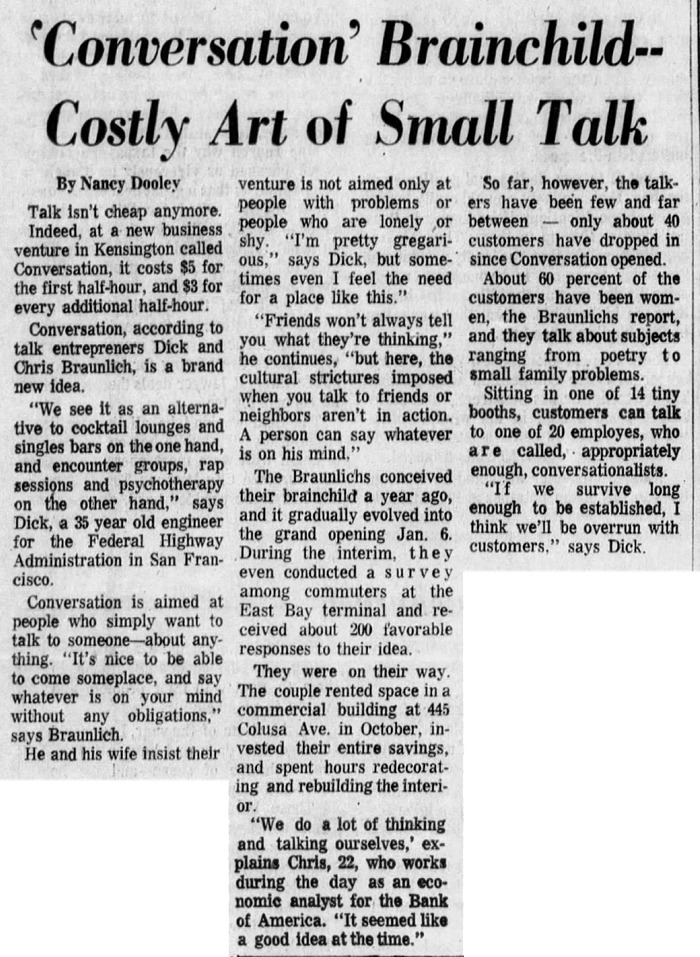
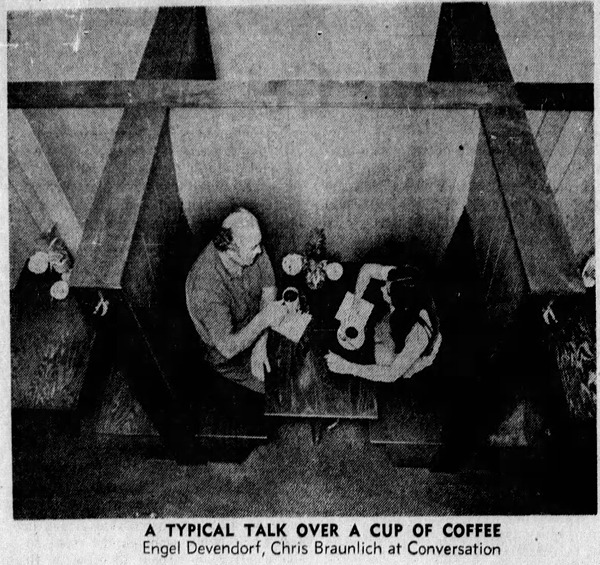
San Francisco Examiner - Feb 11, 1973
Posted By: Alex - Tue Oct 15, 2019 -
Comments (3)
Category: Business, Jobs and Occupations, Psychology, 1970s
Pig Poop Sniffer
If you think your job sucks, it could always be worse. You could be smelling pig excrement for $1 a day.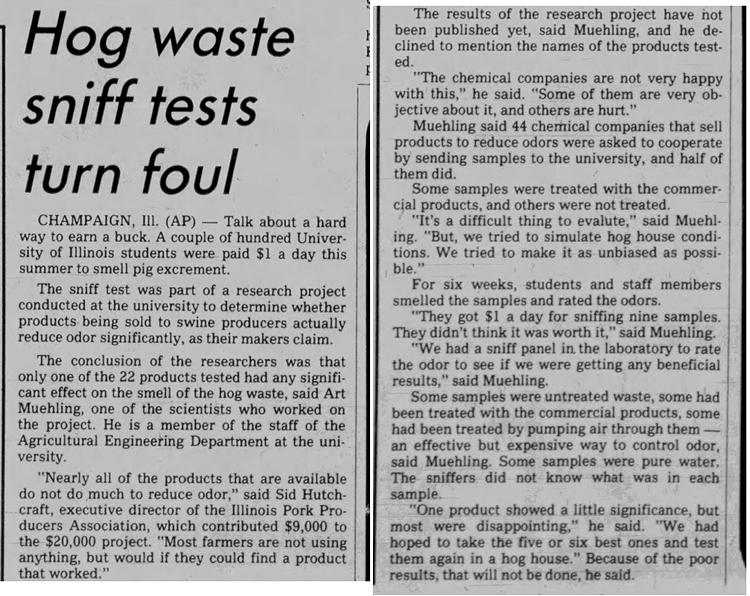
Cedar Rapids Gazette - Aug 25, 1978
Posted By: Alex - Sun Oct 13, 2019 -
Comments (1)
Category: Animals, Jobs and Occupations, Excrement, 1970s
Happy Labor Day 2019!
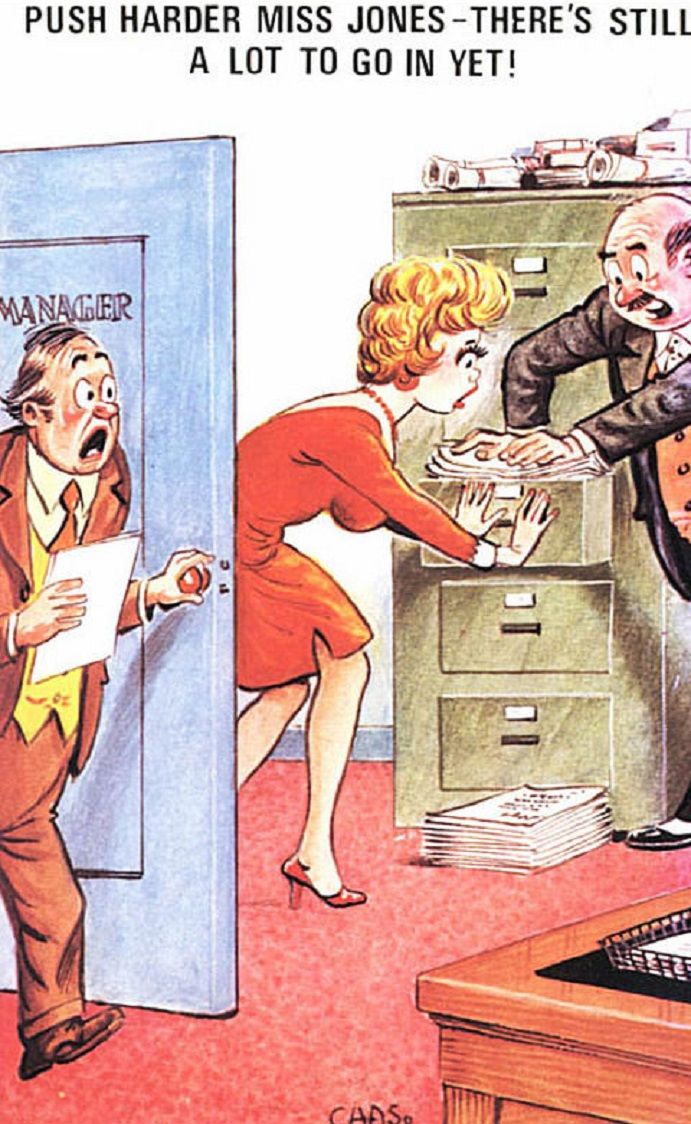
Posted By: Paul - Mon Sep 02, 2019 -
Comments (1)
Category: Holidays, Jobs and Occupations
Rosa Hernandez: The Cleaning Lady
When San Diego performance artist Claudio Cano does her act, much of the audience isn’t aware that she’s actually performing, because her performance consists of dressing up as a Latina maid (whom she calls Rosa Hernandez) and sweeping or mopping the floor of art galleries. She notes that people in the galleries will often complain to the front desk about the maid cleaning while they're trying to look at the art, unaware that the "maid" is part of the art.Cano also sometimes performs outside, where, in her maid outfit, she does stand out more. But even then, she notes, people rarely pay much heed to her, seeming to go out of their way to avoid her.
More info: ClaudiaCano.com, Only Here Podcast
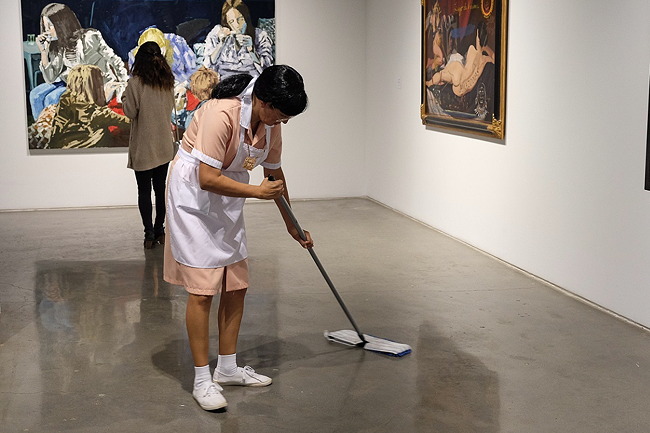
Cano performing at SDSU Downtown Gallery
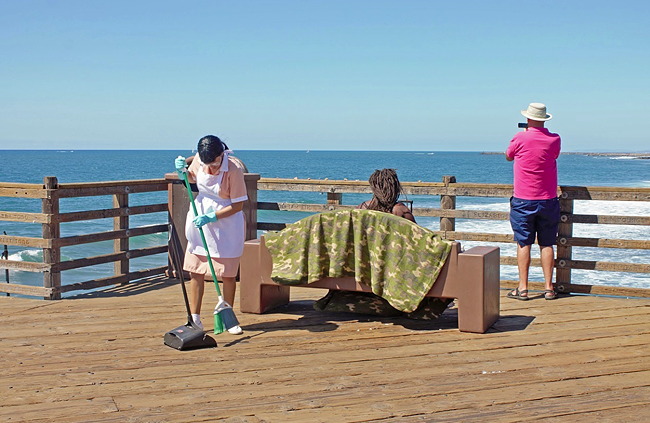
Performing at Oceanside Pier
Posted By: Alex - Thu Jun 27, 2019 -
Comments (6)
Category: Jobs and Occupations, Performance Art
The Rewards of Heroism
If there were a Cheapskate's Hall of Fame, the Chicago Board of Education would surely have to be in it. In 1994, after gym teacher Clarence Notree heroically saved a group of children from a gunman who had entered the school gym by shielding them with his body, the Board of Education informed him that he wasn't entitled to Workers Compensation for his injuries because saving children wasn't technically part of his job.After a protracted legal battle, he did finally get a settlement of $13,447.
More info: NY Times

Opelousas Daily World - Sep 30, 1994

Franklin Daily Journal - Sep 30, 1994
Posted By: Alex - Fri Jun 14, 2019 -
Comments (0)
Category: Jobs and Occupations, Lawsuits, 1990s
Bad-Breath Evaluator
Not as bad a job as being a gasmask tester. But still, pretty bad.
San Francisco Examiner - Oct 21, 1997
Posted By: Alex - Tue May 21, 2019 -
Comments (0)
Category: Jobs and Occupations, 1990s

| Who We Are |
|---|
| Alex Boese Alex is the creator and curator of the Museum of Hoaxes. He's also the author of various weird, non-fiction, science-themed books such as Elephants on Acid and Psychedelic Apes. Paul Di Filippo Paul has been paid to put weird ideas into fictional form for over thirty years, in his career as a noted science fiction writer. He has recently begun blogging on many curious topics with three fellow writers at The Inferior 4+1. Contact Us |




